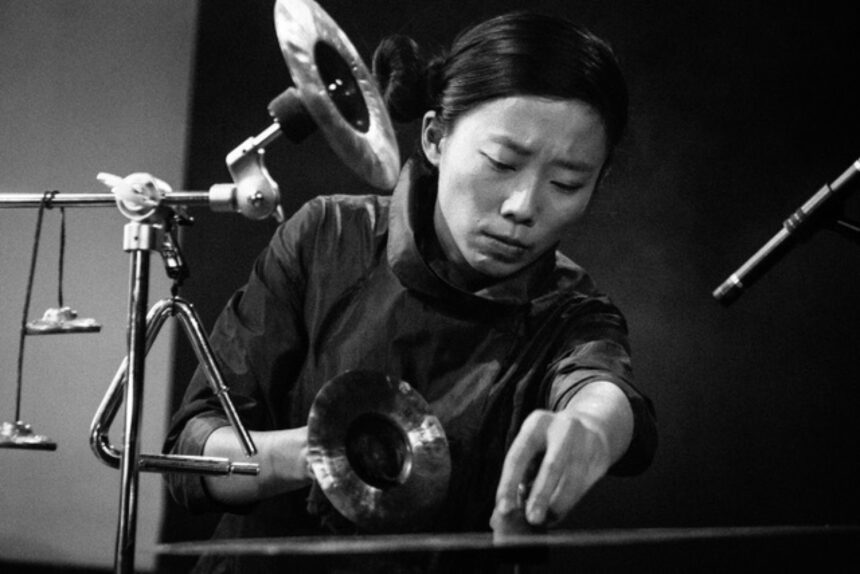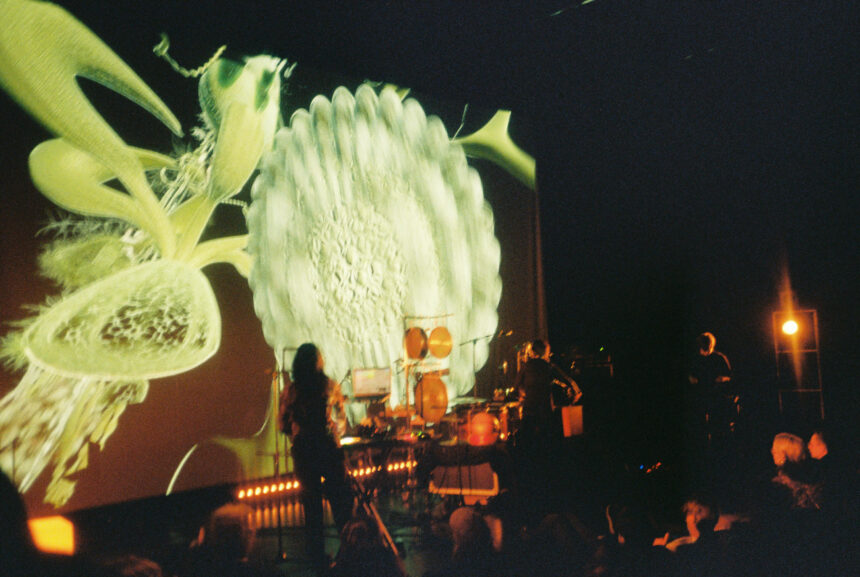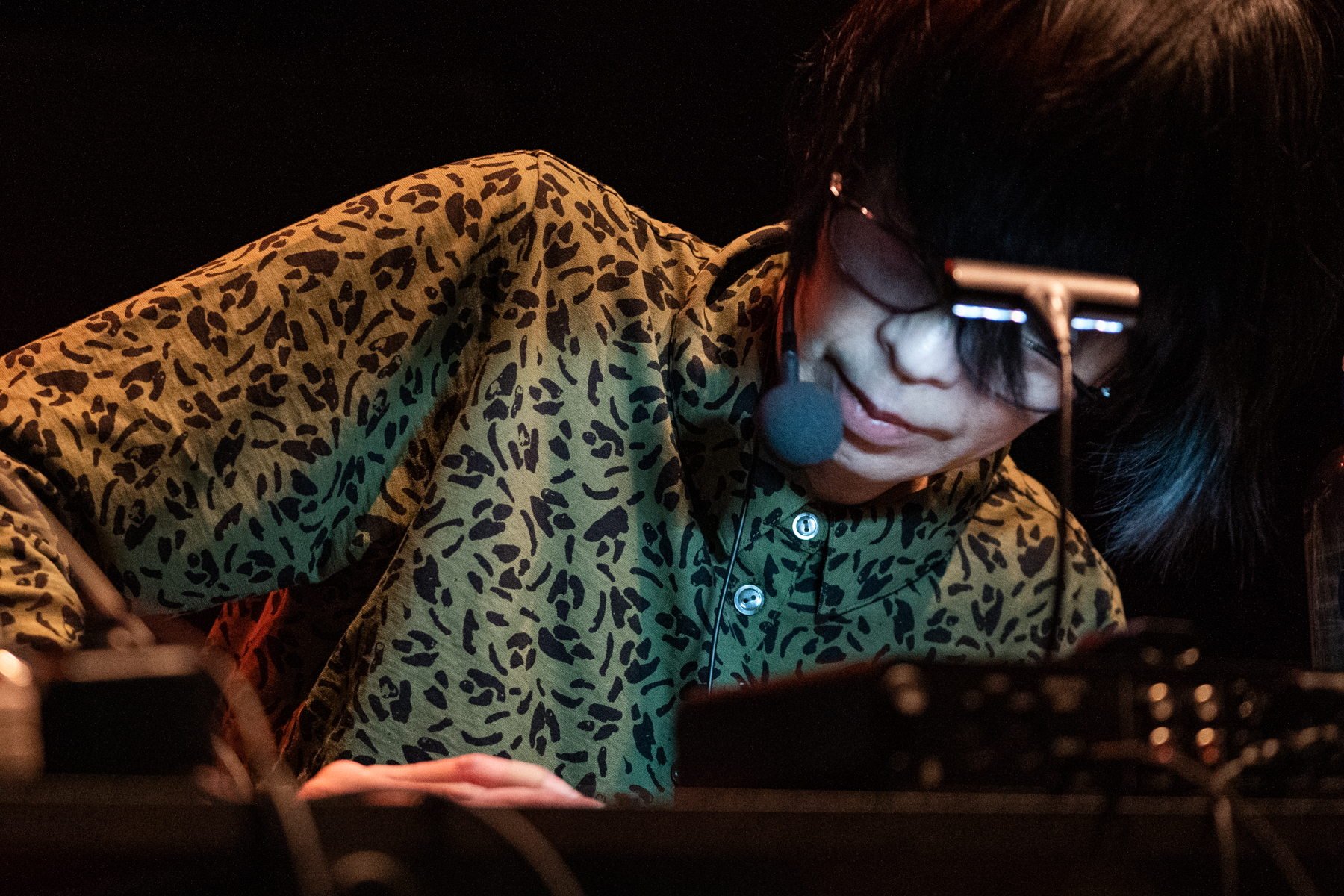Ying-Hsueh Chen – “ I still believe that true freedom comes from being rooted in discipline” (interview)

Interview by Alexander Julin Mortensen, photo by Malthe Folke Ivarsson
Over the years, the Copenhagen-based Taiwaneese artist Ying-Hsueh Chen has manifested herself as somewhat of a singular artist in the Danish art music scene due to both her own music as a percussionist, her compositions for other ensembles, the concert series “Ancestral Modernism” and her impressive performances of, among others, Iannis Xenakis’ music – whose compositions would be regarded by most people as rather challenging to perform.
Two aspects which are rather characteristic of her practice as an artist are tradition and architecture. While her music might not be nostalgic or traditional in any clear sense, her belief in the importance of the maintenance of musical traditions is still essential to her view on and approach to her artistic work as well. As Chen explains in our interview, “Tradition comes from the predecessor’s enormous creativity and dedication, and that knowledge becomes tradition that transcends time. I still believe that true freedom comes from being rooted in discipline. Skipping over tradition to be “free” results in less quality – and less freedom.”
As a composer, Xenakis found big inspiration in architecture, which he also worked extensively with. The same can surely be said for Chen, whose passion for Xenakis both comes clearly across in her own performances as well as in this interview. Concerning her own view on architecture and music, Chen explains that she’s “(…) always loved the architectural sides of classical music – all these symphonies, fugues and sonatas with the perfect proportion fascinates me”. Her love of architecture have led her to work with the interrelation between that and music, which has resulted in performances at places such as Thorvaldsens Museum and Axelborg Rotunde as well as Brønshøj Vandtårn where she currently works on a project with video artist Rikke Benborg, sound artist Jacob Kirkegaard and cinematographer Christian Laurensen.
Passive/Aggressive has interviewed Chen about her background, thoughts on the contemporary art music scene in Denmark, the importance of traditions as well as some of her recent and forthcoming work. Read the interview in full below.
P/A: Could you start by telling a bit more about your musical background? What sparked your interest in the musical fields you engage and work with today?
YC: “I was born into a family of woodbusiness, and I lived right next to wood factories in the first 15 years of my life, until I left the USA. I was exposed to dusty environments with the sound of machinery and other so called ‘noises’, and I believe that made certain kinds of experimental and contemporary music dear to me.
My ancestors up to my grandparent’s generation were farmers and fishermen, and my mother is the very first woman in my family’s ancestry line who went to school. It is a mystery that both my brother and I became so interested in Western classical music at a young age… It seems to be a big leap. However, it was, and still is to some extent, a trendy belief that “everything in the West is just better.”
Since I was young, I had the basic need to explore the body’s extreme. I was an unusually disciplined child with an athletic tendency and strong will to excel. It will be hard for a Danish mindset to understand how a child can practise 3-5 different kinds of art forms (painting/drawing, calligraphy, piano, percussion, ballet, acrobat, sports) daily, out of her own will. For example, already knowing that ballet wasn’t really my kind of dance, I was fascinated by the technical side of it anyway – how to spin the most effortless way etc. At home, I would also practise obsessively how to jump the farthest from A to B and how to throw a basketball against the wall with the fullest power.
However, there is a price with it: I was quite a lonely child, and in my entire 20’s I rebelled strongly against discipline (and I still do but to a lesser degree) when I realised that there are so many other things in life that are important.”
“It makes me sad that, due to massive westernisation and popular culture, Taiwanese traditional music is disappearing so rapidly.”
Ying-Hsueh Chen
P/A: Have your Taiwanese roots had any impact on your approach to and interest in music in any way?
YC: “It was not that long ago that my father revealed to me that I have indigenous Taiwanese DNA, which made a lot of sense to me in terms of why I have a “dark sound”. As I grew older, I became more and more drawn to traditional music and folklore from all over the world. I love the architectural/structural side of Western classical music, yet I love even more that a lot of traditional music, such as Korean Shaman music, which has a strict frame with possibilities to improvise within the structure.
It makes me sad that, due to massive westernisation and popular culture, Taiwanese traditional music is disappearing so rapidly. My father is a good singer so I was exposed to folk songs to a certain extent, otherwise I myself rarely experience Taiwanese culture heritage on TV or live. Sure, all these rituals in the temples still exist, however it is largely considered as “low class”, which I absolutely don’t agree with. Taiwan has been colonised so many times that we have a tendency to degrade our own cultural heritage.”
P/A: In the past years, you’ve performed works by the late composer – and much more – Iannis Xenakis on a number of occasions. Can you elaborate on your relation to his music and how it resonates with you as an artist?
YC: “I have a strong and mysterious tie with Xenakis’s music, and looking back, his music has formed a big part of my career and musical identity. I have tried to find explanations for why that’s so.
As said, I have always loved the architectural sides of classical music – all these symphonies, fugues and sonatas with the perfect proportion fascinates me. However, I’ve always also had a bit of trouble with the aristocratic vibe in certain classical music – it is only after I came to Europe that I started to understand the music of Mozart.
Xenakis’s work explores not only the infinite possibilities of structures, but also the mystery of nature and extremities in humans, which are often the essence of Greek literature too. Xenakis is very interested in bringing back Greek ancient tradition to modern life. I sort of have the same mission to bring what is overlooked alive again, which is reflected in the “Ancestral Modernism” concert series that I organise.
“Performing his music is not at all comfortable – if my mind kicks in, then I’ll mess up – just like sports.”
Ying-Hsueh Chen
A lot of his music is very deep and “idealistic” – he didn’t give a damn about actual technical difficulties, which evokes the primitive and athlete DNA in me. I can spend hours in the practice room trying to find out how to make my movement better and effortless – and it never ends – and the deep satisfaction that comes with it.
Performing his music is not at all comfortable – if my mind kicks in, then I’ll mess up – just like sports. I had two very bad memory slips too, because I began to “think ahead” or to “control”. I also had several ‘out of body-experiences’ when I played Xenakis’s music, and it is so gratifying when it happens – and addictive too! That’s the magic of certain contemporary music – it’s so extreme that it goes beyond the polarities.
P/A: As you mention, you also organise the concert series “Ancestral Modernism”. What characterises the music you present under the series and what are the underlying aims of it?
YC: “The Ancestral Modernism concert-series offers audiences deep and universal sonic experiences that are rooted in tradition. The series unites musicians, composers, and instrument builders of high integrity to create timeless experiences.
The repertoire includes traditional music from all over the world (such as Korean Court and Shaman music, Japanese Buddhist Shomyo Chant, and Romanian and Scandinavian folklore), improvisation and contemporary music. And these years the series focus on certain elements – for example, this spring we made a concert of only bones and shells, inspired by Dr.Eva Fock’s project “Lyden af Oldtiden”, in which I had the pleasure to learn about what our ancestors played on in Stone and Iron Age.”

P/A: Earlier this year, I had the pleasure of witnessing your concert at Intonal Festival in Malmö, which was a collaboration between you, Danish trombonist Maria Bertel and Mexican-born artist Vica Pacheco. How did your collaboration come about? And what did you try to create with the piece?
YC: “For this particular concert, Vica wanted to specifically work with a woman trombonist and percussionist. The Festival suggested Maria, then Maria suggested me. Voila, that was how it came about – and it was the first time we ever worked and played together. We seemed to be a good match from the very first day we met. We all have a “dark sound”. Vica’s video, “ITA”, explores organic mechanisms in depth, and it is very interesting to work with the visuals and create music that brings out the power and complexity of nature with music.”
“When I compose, I aim to achieve something that is simple, radical and profound at the same time.”
Ying-Hsueh Chen
P/A: Your most recent composition is entitled “Ø” and was performed by the Danish music collective (and much more) Damkapellet. How do your compositions for other ensembles differ from music you intend to perform yourself (either solo or in a certain constellation)? How does the ensemble influence the way in which you compose music?
YC: “I have been to many of Damkapellet’s concerts, and I thought about creating a piece which is far away from what they already have in their repertoire and yet still suit them. When I compose, I aim to achieve something that is simple, radical and profound at the same time. I aim to achieve the same with my percussion performances and composition. However, I’m no string player, so I delivered a 30 minute long string octet in a whispering level with the aim that it becomes a collective deep listening for everyone – both the musicians and the audiences.”
“I don’t want music to be niche, nor do I want music to be commercial or become any means to personal success. And how can we achieve that?”
Ying-Hsueh Chen
P/A: You once stated that your aim is to make contemporary music easier to understand. Why’s that important to you? Is it important to make music, which might be characterised by a high degree of complexity, accessible to more listeners?
YC: “I made that statement on my website in 2014, but today I would say it in a more nuanced way: I want contemporary music to be for people from all walks of life, and not just for trained ears – it should also open up the untrained ears. I don’t want music to be niche, nor do I want music to be commercial or become any means to personal success. And how can we achieve that? I think it is the intention of the creation of music and the craftsmanship from the performer and composer that makes all the difference. The real success comes from being so genuine that it moves the deep core of human seed.”
“I still believe that true freedom comes from being rooted in discipline.”
Ying-Hsueh Chen
P/A: How would you describe the current state and trends of the contemporary art music scene in Denmark? And how do you feel your own music fits into this state or tendencies?
YC: “I like the general vibe in the Danish contemporary art scene – “snobbish contemporary music” is generally less encouraged here than in other European countries I’ve visited, which opens the door for many other forms of new music.
At the same time, I’m a bit concerned about the general overlook of the importance of craftsmanship and tradition. Tradition comes from the predecessor’s enormous creativity and dedication, and that knowledge becomes tradition that transcends time. I still believe that true freedom comes from being rooted in discipline. Skipping over tradition to be “free” results in less quality – and less freedom.”
P/A: Can you disclose what kind of projects you’re currently working on?
YC: “I’m currently working on a new film project called “Mirage” and a “Sonic Architecture” concert-series that come with it. In this project, I specifically chose buildings which I regard as examples of masterful architecture and which, at the same time, can enable very long echoes. The project is inspired by my previous concerts in Thorvaldsens Museum and Axelborg Rotunde. I learned that, in such grandiose buildings with very long echoes, I didn’t need to do much. Just some single beats on a shaman drum or a woodblock triggers the buildings to “talk” themselves. Or: I can use the long echo build layers and make a “mirage effect”, therefore the name of the film project is called “Mirage”. I compose most pieces spontaneously on the site.
We have a fantastic team: Video artist Rikke Benborg, sound artist Jacob Kirkegaard, and cinematographer Christian Laurensen. Earlier this month, we had an intense filming and recording session in Brønshøj Vandtårn – and it is such a breathtaking space that enables us to be creative visually and sonically. I’m still haunted by the experience.”
Ying-Hsueh Chen is playing her next concert at Brønshøj Vandtårn on September 2.



